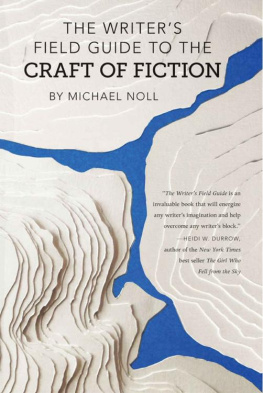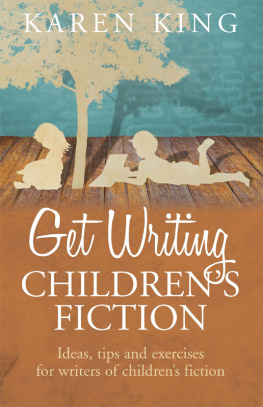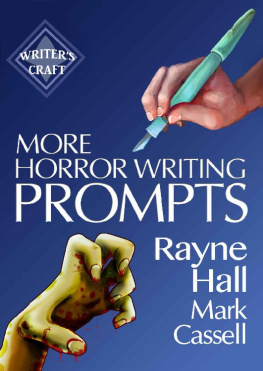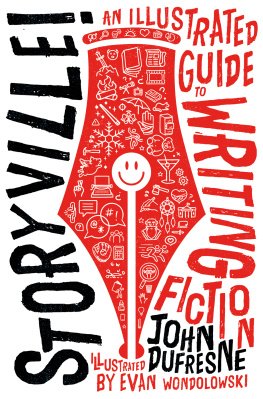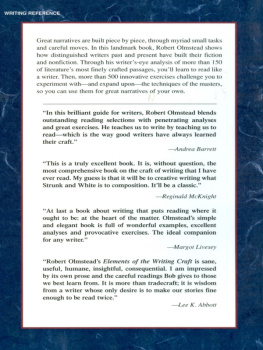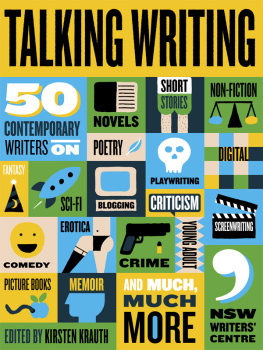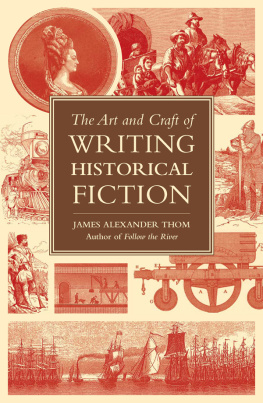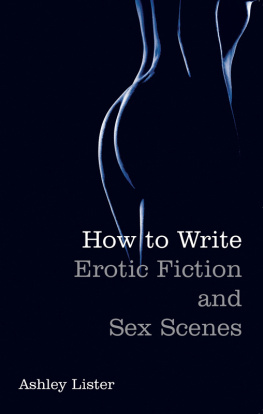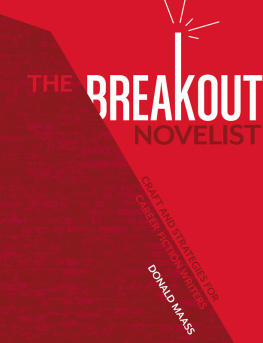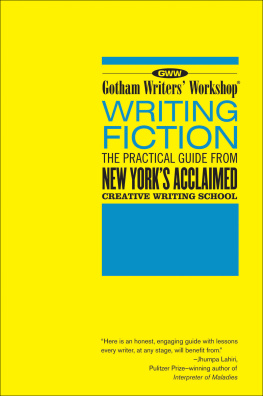PRAISE FOR THE WRITERS FIELD GUIDE TO THE CRAFT OF FICTION
There comes a time in every writers education when they realize they dont know what the hell theyre doing. At this point, a writer can throw in the towel, take out student loans for another round of schooling, or discover a brilliant book like Michael Nolls The Writers Field Guide. With patience, good humor, and fortitude, Noll provides a field manual for taking fiction apart and putting it back together again, gaining technical know-how and inspiration along the way. An indispensable book that belongs on every serious writers desk.
AMANDA EYRE WARD, author of The Nearness of You
These exercises are a true inspiration for both novice and experienced writers. The Writers Field Guide is an invaluable book that will energize any writers imagination and help overcome any writers block.
HEIDI W. DURROW, author of the New York Times bestseller The Girl Who Fell from the Sky
Michael Noll, having grown up a curious, pragmatic Midwestern farm boy, now passes along some of his hard-earned fiction writing wisdom, freeing us from the Behold! Genius-at-work writing myths in the process. As a writer youll still find yourself in awe of what Nabokov, Morrison, or Chekhov do on the page, but Noll shines some new light on how fiction writers might reexamine story form, character, and language through an old but nearly forgotten methodclose reading and imitationand build their own entirely original works. Because theres less theory and more practice, we all benefit. Tell me a story, he quotes one of his former instructors urging, which seems simplistic until you look at how often we avoid doing just that. A terrific, truly curious book about the humbling practice of writing fiction.
SCOTT BLACKWOOD, author of See How Small, winner of the 2016 PEN USA Award
For years, Michael Nolls Read to Write Stories blog has been one of my favorite resources, period. Now, at last, along comes his Writers Field Guide, in which reading and writing are rightly treated as inextricable, such that every sharp insight and lively provocation is rooted in the terra firma of great writing. Indeed, its primary text excerpts are impeccable, but it is also Nolls own intuition, reading acumen, and willingness to push beyond the obvious that ultimately make these exercises so worthwhile, and the book a gem.
TIM HORVATH, author of Understories
THE WRITERS FIELD GUIDE TO THE CRAFT OF FICTION
Published by A Strange Object
An imprint of Deep Vellum Publishing
3000 Commerce Street
Dallas, Texas 75226
astrangeobject.com | deepvellum.org
2018 Michael Noll. All rights reserved.
Printed in the United States of America.
No part of this book may be used or reproduced in any manner without written permission from the publisher, except in context of reviews.
ISBN 978-0-9985184-1-1
ISBN 978-0-9985184-2-8 (electronic)
Cover design by Lisa Laratta
Book design by Amber Morena
For Stephanie
CONTENTS
by Amelia Gray
by Owen Egerton
by LaShonda Katrice Barnett
by Percival Everett
by Nina McConigley
by Antonio Ruiz-Camacho
by Gillian Flynn
by Lydia Davis
by Manuel Gonzales
by Daniel Jos Older
by Ben Marcus
by Karen Russell
by Joe R. Lansdale
by Bret Anthony Johnston
by Rachel Kushner
by Teju Cole
by Zadie Smith
by Kelly Luce
by Jennifer duBois
by William Gibson
by Elizabeth Tallent
by T. C. Boyle
by Marlon James
by Jesmyn Ward
by Jim Shepard
by Jennifer Weiner
by Elizabeth McCracken
by Laila Lalami
by Emily St. John Mandel
by Alexander Chee
by Benjamin Alire Senz
by Roxane Gay
by George Saunders
by Ethan Rutherford
by Samantha Hunt
by Katherine Catmull
BY MARY HELEN SPECHT
BY KIESE LAYMON
BY ROBERT GLINSKI
BY CELESTE NG
THE WRITERS FIELD GUIDE TO THE CRAFT OF FICTION
INTRODUCTION: A GRAND THEORY OF NOT KNOWING WHAT YOURE DOING
When I was sixteen, I was accepted into a monthlong camp for smart kids, the Kansas Honors Regents Academy, an honor that verified what Id long suspected: I was brilliant and bound for greatness. I packed my bag, and my father drove me from our farm to a city I had never visited. The academy was held at Wichita State University, where the bunch of us budding scholars took two classes for college credit. I signed up for a course on Platos Republic, having never read Plato, any piece of philosophy, or even a single text older than Shakespeares plays. But I was smart and curious, and I figured that Id catch on fast. Then I began reading.
I couldnt make heads or tails of the book, and the lectures werent much easier to understand. In The Republic, Plato introduces the concept of ideal forms, which the professor explained by pointing at a table. When you see a table, he said, you know its a table. Why? There are many different kinds of tablessome with four legs, some with six, some with leaves, some that fold, some made from wood, others made of metal. How can you look at such varied objects and instinctively identify them as tables? The answer had to do with tableness, the ideal form that all worldly tables aim for but never quite reach. Some students nodded, ah yes, we understand. Mostly, these were the students from the big high schools in major cities. A few well-read rural kids intuitively seemed to grasp the concept as well. But not me. I kept looking at tables, peering under them, trying to puzzle out what form meant.
A few days after the academy ended, I spent the morning working with my dad and brothers. Who knows what job we were up to: vaccinating or castrating pigs, grinding feed, shoveling the last couple hundred bushels of corn out of a grain bin, or fixing some broken machine. Farm life revolves around manual labor, not just knowing how to do somethinglike stack hay bales so they wont fall overbut also how to do it efficiently so that you can throw and stack hay for eight hours on a muggy summer day. On this day, my brothers and dad and I came home for lunch, grabbed the mail, and shed our manure-crusted shoes and jeans, our piggy shirts and dusty hats. My dad handed me an envelope from the Academy. It was my final paper on Plato. Everyone wanted a look, but I shielded them and read the professors comments. The only part I remember was this line: You are not excessively intelligent. I was dumbstruck but tried to play it off like I wasnt surprised. My brothers and dad thought this was hilarious, and when I tried to explain to them that the professor really meant that I wasnt too smart, overly smart, they quickly agreed with him.
After living with the description for a couple of decades, I think the professor meant that I was not an egghead. It may have seemed unlikely to him that I would become an academic. I was more suited for engineering or medicine, some profession that values the practical application of knowledge rather than grasping after answers to abstract, rather than concrete, questions (What is a table, really? What is justice?).
Its satisfying to say that he was wrong. I taught writing at a university for twelve years. Ive even taught students to write about Platos Republic. But my professor was right about my intellectual temperament. Though I worked in an English department, Im not a philosopher or even a literary critic. My mind works with the material of the world, not the abstract universe of forms, and that is why I became a writer.
Next page
